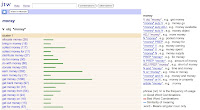- How do your students currently register and explore collocations?
- What are the advantages and disadvantages of using Google to determine likelihood?
- What sorts of information do your students need to be able to use the word?
I've made a SCREENCAST VIDEO to walk you through them. (5 minutes)
1. LINGUEE: Linguee http://www.linguee.de/ is an online translation lexicon that shows you how German, French and Spanish is being translated into English online. Trawling the net, it picks up parallel pages, the original and its English translation, and scours them for direct translations. Parallel excerpts are presented side by side, and the translated word or phrase is highlighted, with each excerpt visibly linked to the original website, showing the context. To the left is a lexicon extracted from the database for the words in the search. A nice site to start noticing how collocations are often flavored by L1.
Drawbacks: All too often the translations are sub-par – after all, they are no better than the cross-section of translations we find on websites. However, the translations are highly contextualized and reflect actual useage "on the ground" (English as a Lingua Franca). Also, the site allows users to assess the quality.
2. GOOGLE FIGHT: You and your students can explore collocations by trial and error, guessing two possible or likely collocations and comparing them using Google Fight http://www.googlefight.com/ to assess which one is more frequent.
Drawbacks: The online selection you browse is not curated and edited, nor does it give you the context of each collocation. Likelyhood is across all of the genres present on the web, so the context your students need may not be afforded.
Google itself automatically offers likely collocations as you type in phrases during a search, suggesting ways to complete them.
3. GOOGLE NGRAM: Drawing on all the works published to the internet and dating them by original date of publication, Google Ngram http://books.google.com/ngrams/ creates a timeline of word usage, and is also a good place to compare how collocations have changed over time.
Drawbacks: The selection is decontextualized across all genres. Though you can follow up the sources, this is an item-by-item research project.
4. NETSPEAK: Being developed specifically for learners/users of English, Netspeak http://www.nets
 peak.org/ is a set of tools built around a search engine that allows 4 modes of search for collocations: one word, several words, alternatives in in the phrase (so: a better synonym), and word order. Collocations are presented showing their relative online frequency compared amongst each other. Press the + sign to the right, and sample sentences are presented. How this site can be used in the writing process is shown in this INTERACTIVE VIDEO.
peak.org/ is a set of tools built around a search engine that allows 4 modes of search for collocations: one word, several words, alternatives in in the phrase (so: a better synonym), and word order. Collocations are presented showing their relative online frequency compared amongst each other. Press the + sign to the right, and sample sentences are presented. How this site can be used in the writing process is shown in this INTERACTIVE VIDEO.Drawbacks: The corpus is the uncurated web, with all its genres. (More information.)
5. JUST THE WORD: Based on the British National Corpus, Just the Word http://www.just-the-word.com/ (Sharp Laboratories of Europe 2005-2011) allows you to study word clusters i
 n combination with their grammatical functions (colligations), combining the functions of a thesaurus and a dictionary. Clicking on a given collacation gives you examples of how it is used from the BNC. (More information)
n combination with their grammatical functions (colligations), combining the functions of a thesaurus and a dictionary. Clicking on a given collacation gives you examples of how it is used from the BNC. (More information)Drawbacks: Rather than a simple comparison of frequency, the system gives you a wealth of potentially distracting information. Still, the site is neatly contained.
6. LEXTUTOR: Originally set up in the 90s, The Compleat Lextutor http://www.lextutor.ca/ from the University of Quebec at Montreal has tutorials (including a lexical grammar test, Corpus Grammar, and the Concord Writer, where you can check collocations as you write); and research apps (including Vocabprofile, to copy complete texts or selected corpora into as .txt files to analyze, with analyzed words then color-coded according to frequency/ corpus). Each app comes with an introduction on its own page.
Task:
Select a collocation issue you want a class of yours to explore. What are your aims? What will the students do with the outcome?
Which of these sites would you use? Defend your choice.
How would you word and run the task?
Your ideas and reports on your experience are most welcome!
PS Anthony Elloway has collected these and similar sites and discussions in a Scoop.it page.
2 comments:
Anne,
Thanks for this excellent overview of how and where to explore collocations online! I'm now in the run-up to end-of-year assessments but will have a closer look over summer (Australian summer that is!) to see how I might use some of these in my context.
BTW, the link at the end isn't to Anthony's Scoop.it page but to a BC/BBC TeachingEnglish page on concordancers. Anthony's Scoop.it is at http://www.scoop.it/t/collocations-corpora-concordancers
Cheers,
Lesley
Thanks, Lesley, and I'm curious how you decide to use this sortz of thing. Also thanks for the link - all corrected!
Post a Comment